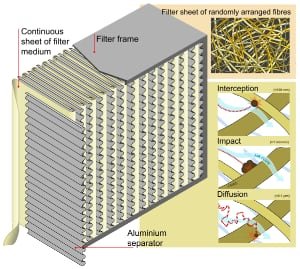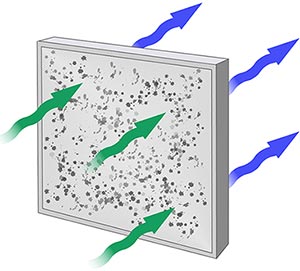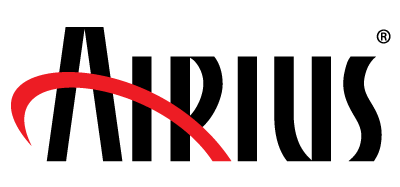Filter systems are effective at removing allergens, mold spores, and viruses from the air so they are not circulated after they are captured.
Air filter systems are found all around — you’ve likely changed one (or at least we hope so!). Most HVAC systems have air filters at the air return, and your car has an air filter for the cabin. Air filters work by collecting small particles of debris as air passes through the filter. The rating of the filter dictates how small a particle can be caught.
HEPA filters are the elite air filters when it comes to small particles. HEPA stands for High-Efficiency Particulate Air and is a specific class of filters. They are designed to catch 99.97% of particulates.
Two important factors to note when considering filter systems are the frequency that you’ll need to replace the filters and the costs associated with your particular system.
History of Air Filters
Air filtration has been around for a couple of hundred years. The first attempts to filter air came during the industrial revolution. Then, the goal was to protect firefighters from dangerous smoke when they entered a burning building. The next evolution came with a charcoal-based design in the masks to help with pollution from the coal industry.
Modern-day HEPA filters were originally utilized as a top-secret tool by the US military during World War II. The filters were intended to be a barrier against chemical warfare and nuclear fallout. The HEPA filter we use today was birthed out of this early model. (link to source: https://www.achooallergy.com/blog/learning/the-history-of-air-purifiers/)
The various iterations of air filters throughout history were all designed to help people breathe better.
Filter Usage Today
Today, air filters are in the cars we drive, in our homes and offices, in the grocery store, and in the shopping mall. Most indoor places, especially with air conditioning, have some type of air filter to help purify the air. Below is an outline of the types of filters in various locations.
- In a medical facility, such as a hospital or clinic, you’re likely to find HEPA filters in use. These trap the majority of contaminants and are most suitable for a place where airborne substances are a threat.
- You’ll also likely find a HEPA filter in an environment that needs to be dust and particle-free, such as a facility for electronic manufacturing. Since HEPA filters can catch the smallest of particles, a facility that produces semiconductors, for example, would highly benefit from the high performance.
- In your car’s cabin filtration system or engine filter, you probably won’t find a HEPA filter. More likely it will be some type of pleated-paper filter. These filters work great for common dust and allergens. They aren’t rated as highly as HEPA filters, but they also don’t need as stringent of requirements. These filters tend to be lower in cost to produce and use.
- Home AC filters tend to utilize a pleated-paper filter as well. These vary in efficacy using the MERV (minimum efficiency reporting value) number to indicate the level of filtration possible. Though some companies have developed their own metrics, the higher the number, the better the filter is at removing air pollutants.
The costs associated with a HEPA filter vary based on the size of the facility or the volume of air you’re trying to purify. HEPA filters will cost more to replace than a pleated-paper filter. Take this into consideration when deciding whether you need the high performance of HEPA or if a well-functioning paper filter will do the job. In either situation, you must consider the upfront cost of the system as well as operating costs to purchase new filters as old ones get dirty.
How to pick the right filter
 Each application is unique when it comes to air filters. Here are a few things to keep in mind when making a selection.
Each application is unique when it comes to air filters. Here are a few things to keep in mind when making a selection.
First, consider your environment. Do you need particularly pure air for medical or manufacturing reasons? Or can you live with “normally” pure air? Note that it’s not about whether you want dirty air or not. But rather, do you need the ultimate pure air, or is regularly purified air sufficient? This question is about what you’re doing in the space.
The next consideration is the people in the space. Are you working with people who may have respiratory conditions that require a higher level of air purification? Are there potentially ill people in your area often who may be unintentionally filling the air with microbes? (Note that while HEPA is not rated for viruses, there are studies showing that it could help.) You’ll want to consider the needs of your employees and customers when selecting an air filter system.
You also need to consider the cost of your air filter system. A standard pleated-paper filter is going to cost less to replace than a HEPA filter. There are some reusable filters you can purchase, but that comes at the cost of having to wash and keep up with them. The maintenance of filters is a cost that shouldn’t be overlooked. A dirty filter can reduce the efficiency of an HVAC system (resulting in higher costs) and even limit the amount of air that is actually filtered.
Things to consider when choosing an air filtration system
Air filters work by trapping dust and other particles from the air. But over time — sometimes very short amounts of time — the filter will need to be replaced. If the filter is too clogged, it won’t be effective in cleaning the air in your space. One drawback to consider is that disposable air filters can be pricey and carry environmental impact. On average, filters need to be replaced every 3 months and often pile up in landfills. There are reusable filters that simply need to be cleaned every few months and replaced every 5 years or so. These are better for the environment, but often much more costly up-front.
Conclusion
Air filtration systems are readily available and relatively affordable to begin with. The ongoing costs of air filter replacement cannot be ignored when considering using filters for air purification.
Talk with one of our air purification experts to find out if a filter system is right for your building.




Leave A Comment
You must be logged in to post a comment.